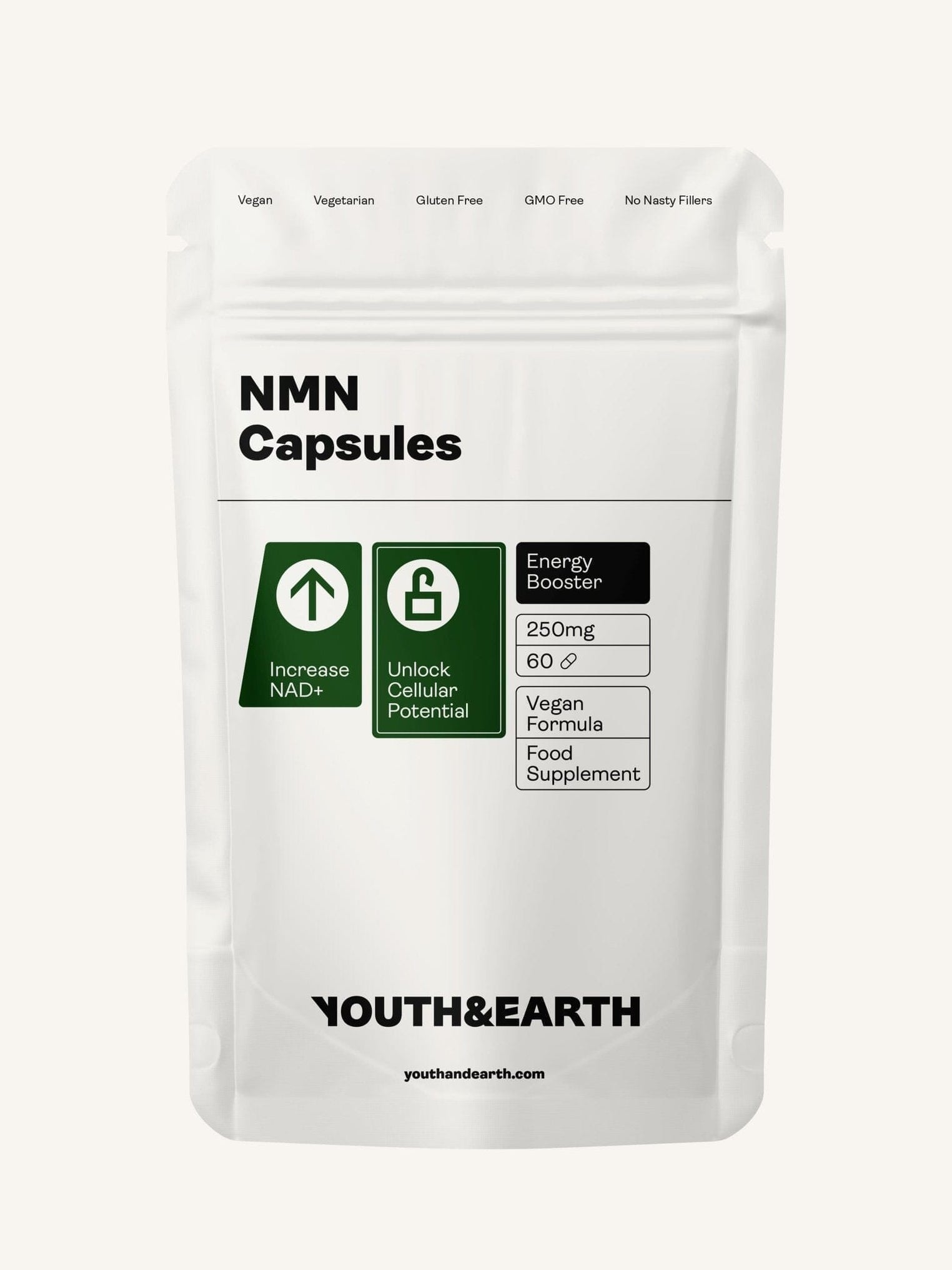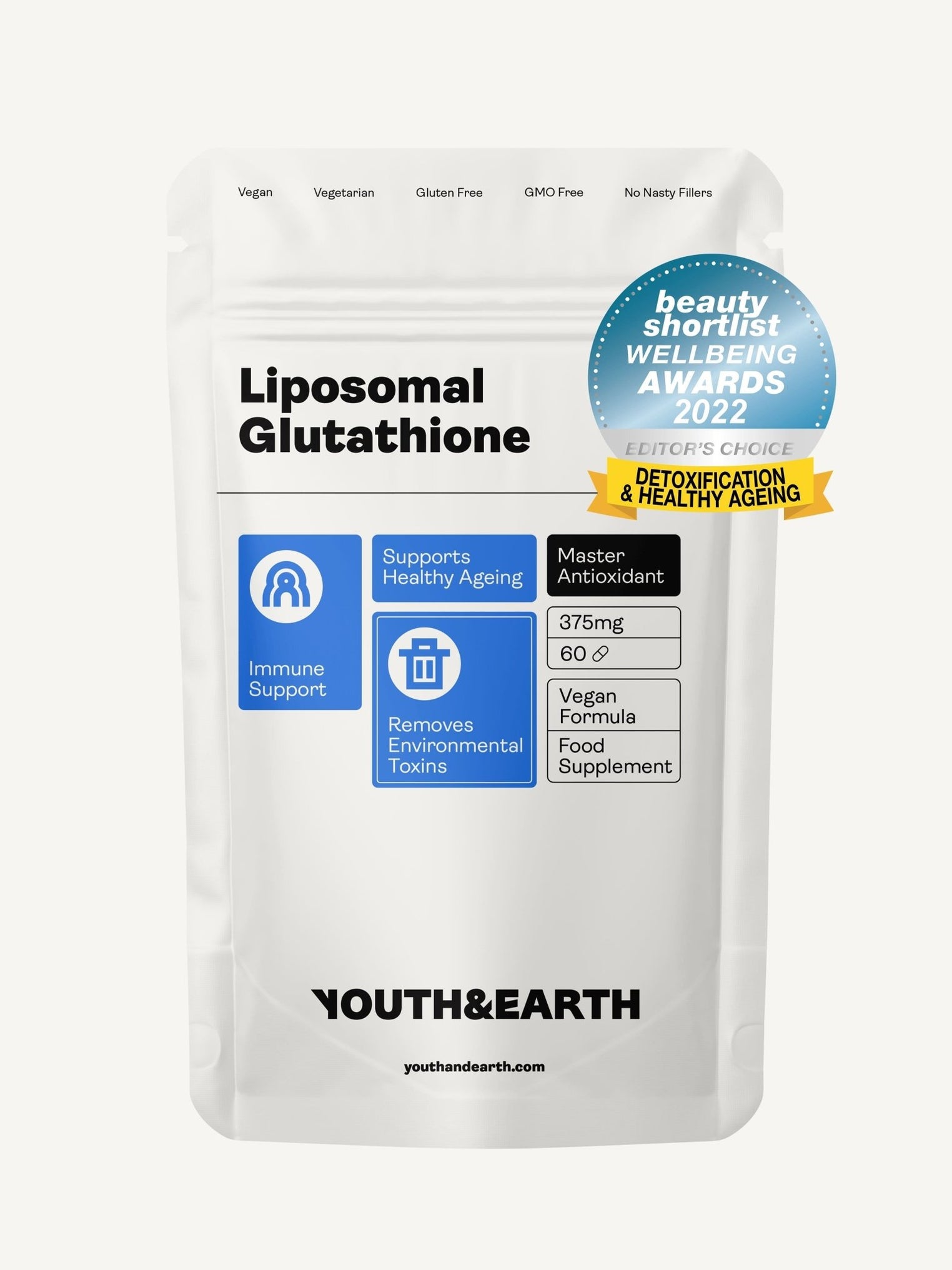Vitamin C has long been touted as the go-to for fighting colds and flu. But taking a vitamin C megadose has health benefits that extend beyond treating the sniffles to helping you live a long and happy life. From easing arthritis to assisting in fat loss, this vitamin is essential to our health in many ways and is an important tool to add to your anti-aging health regime.
vitamin C - What is it
Vitamin C or L-ascorbic acid is one of the 13 essential vitamins your body needs to stay healthy. Ascorbic acid is the abundant form of vitamin C that’s found in foods (at about 80-90%). The rest (10-20%), is dehydroascorbic acid, the oxidized form of ascorbic acid.
This critical nutrient is water-soluble which means it can easily diffuse into the bloodstream because of the aqueous nature of the blood plasma, extracellular fluid, and stomach contents. In the body, vitamin C is absorbed by special transporters in the small intestine called Sodium-Dependent Vitamin C Transporters. (SVCT-1). However, these transporters can only absorb up to 200mg. Therefore, only about 14-30% of traditional vitamin C supplements are actually absorbed, the rest is quite literally flushed away due to solubility of this vitamin.
Unlike other mammals, we can’t manufacture vitamin C which is why we need to obtain it from external sources. Vitamin C occurs naturally in variable quantities in fruits, vegetables, and in the organ meat that we eat such as kidney and liver. Increasing these foods that contain vitamin C is one way to ensure that you’re getting a daily dose of this vitamin. But, not sufficient to experience the full health benefits of optimized vitamin C levels.
"No evidence compels the conclusion that the minimum required intake of any vitamin comes close to the optimum intake that sustains good health."
— Linus Pauling
What Are the Benefits of Vitamin C for Your Health?
The body needs vitamin C to help cell growth, development, and repair of all tissues. For example, vitamin C:
-
Strengthens the immune system.
-
Helps form collagen.
-
Keeps the bones, cartilage, skin, and teeth healthy.
-
Heals wounds.
-
Aids in iron absorption.
-
Protects the cardiovascular system.
-
Supports fat burning and increases metabolism.
In the body, vitamin C plays the role of a cofactor to many critical enzymes. Some enzymes require cofactors to function as they should. The enzymes that need vitamin C are responsible for the biosynthesis of hormones, neurotransmitters, and gene transcription regulators.
Vitamin C also functions as a powerful antioxidant and the tiniest of quantities can protect crucial molecules from cell damage caused by free radicals and reactive oxygen species (ROS). These molecules include DNA and RNA, fats, proteins, and carbohydrates.
What type of vitamin C is best absorbed?
The best vitamin C supplements are those that are high-quality liposomal vitamin C. Liposomal technology encapsulates the vitamin C in phospholipids that bypasses the special transporter and allows close to 100% of the nutrient to be absorbed by the body. Liposomal vitamin C, therefore, has a very high bioavailability.
What is bioavailability?
Bioavailability refers to the proportion of a substance (in this case vitamin C) that enters the circulation system upon the intake of a vitamin C supplement or foods. With traditional vitamin C supplements, only about 200mg of vitamin C can be used by the body because of having to pass through the digestive system and the special transporter.
Although common vitamin C supplements may boast high amounts of this vitamin, because of the limitation in how much the body can absorb, most supplements have low bioavailability and a large percentage of the vitamin is excreted.
Incorporating foods that contain vitamin C will help increase levels of this vitamin in your body. But, when taken in from natural sources, the bioavailability of ascorbic acid is high at lower doses, but as your dosage increases, it drops to below 50%. This trend has led some to a general belief that vitamin C should only be taken in smaller doses resulting in many experiencing low levels and possibly even a deficiency.
What are the signs of vitamin C deficiency?
Most people associate a vitamin C deficiency with images of scurvy-ridden sailors. But even low levels of vitamin C can affect your health and functioning. Here are some of the signs of low vitamin C levels:
Research has shown that low levels of vitamin C can lead to chronic degenerative illnesses. In fact, most infectious diseases are linked to minimal or no vitamin C supplementation.
The Recommended Dietary Allowance (RDA) for vitamin C is 40 mg/d. According to experts in this field, this vitamin C level is not sufficient for treating serious infectious diseases. A person requires several hundred to several thousand-fold times the RDA dosage to build a formidable wall against lifespan-threatening diseases.
What is considered a megadose of vitamin C?
A vitamin C megadose is an injection or consumption of (in a form like liposomal) ascorbic acid that is way higher than the RDA of 40 mg per day.
Megadose vitamin C given intravenously is a regime that is usually administered by a physician. These huge amounts of vitamin C are administered frequently throughout the day depending on the condition of the patient. Intravenous vitamin C treatment has been used for treating respiratory conditions, allergies, arthritis, and even shingles.
It’s also possible to megadose with liposomal vitamin C. Liposomal delivery allows vitamin C to be delivered directly into the targeted cell which allows you to absorb the full 1000 mg of vitamin C. Liposomal vitamin C has been shown to be as effective as intravenous delivery.
Leading expert on vitamin C, Dr. Thomas Levy states:
"My clinical opinion is that one gram of properly-produced and orally-ingested liposome-encapsulated vitamin C is as or more effective than 5 to 10 grams of vitamin C given intravenously, for an acute viral syndrome. When someone is ill, my advice is still to use as many forms of vitamin C as available, and dosed as highly as is feasible."
For more on liposomal supplements and why we use them at Youth & Earth, you might like to read: What Are Liposomal Supplements and How Do They Work?
Buy our Liposomal Vitamin C at 20% Off
Use code DDD20 for 20% off your first order of Liposomal Vitamin C
Who started the vitamin C craze?
Vitamin C has been under the spotlight since it was first proved to cure scurvy. Since then, it has become one of the most studied molecules with thousands of medical studies that have made it so well-known.
As early as 1949, Dr. Frederick Klenner reported that he had cured 60 of his patients who were suffering from polio by giving them a vitamin C megadose of up to 20 000mg daily. His findings were published in a journal, but sadly the medical world didn’t show any interest because the Salk vaccine had just been created. He was the first doctor to emphasize that small amounts of vitamin C would not be effective and he published over 20 medical reports on megadoses of vitamin C to successfully treat bacterial and viral diseases.
"Vitamin C is the safest substance available to the physician."
— Frederick Klenner, MD
In the 1970s, Linus Pauling, a double Nobel prize-winner, became fascinated with the benefits of this humble vitamin. And, from his research and own experience, he became convinced of the benefits of vitamin C in large doses.
He also championed vitamin C megadosing as a way of preventing chronic diseases including cancer treatment and as an effective agent to improve many of the traditional treatments for disease.
Dr. Thomas Levy, the author of Curing the Incurable: Vitamin C, Infectious Diseases, and Toxins, has researched vitamin C in megadoses for years. In the introduction to his book, he says:
“Although vitamin C is an incredibly effective single therapy for many infectious diseases, there are virtually no medical treatments for any infectious disease that are not substantially improved by the addition of vitamin C. The only absolute requirements are that vitamin C be given:
-
In the right form
-
With the proper technique
-
In frequent enough doses
-
In high enough doses
-
Along with certain additional agents, and
-
For a long enough period of time.”
In the last couple of years, this has been shown to be true for the treatment of sepsis and other conditions. Here’s a full interview with Dr. Paul Marik, a critical care doctor at EVMS who uses a megadose of vitamin C in combination with other treatments to cure sepsis.
It’s important to note that megadosing with vitamin C can only be effective if it’s delivered in the correct form such as IV or liposomal form, under specific conditions. Too much vitamin C in another form may cause gastrointestinal side effects such as diarrhea and nausea. It’s best to consult your healthcare practitioner before attempting any megadose regime on your own.
Can vitamin C help with COVID 19?
Although there is no clear evidence yet of vitamin C being able to prevent or cure COVID 19, there are indications that taking vitamin C intravenously may well help. It’s important to note that research is ongoing and vitamin C has been used in conjunction with other interventions.
One of the most recent examples of megadosing vitamin C is in the fight against COVID 19. Experts from Shanghai China found that all patients who received the IV treatment improved and there no one died. There were also no side effects and the stay in hospital was 3-5 days shorter. There is currently a clinical trial on the effectiveness of IV vitamin C for COVID underway in Wuhan China. Results are expected to be out in September this year.
Based on these results and their recommendations, critically ill COVID patients in New York’s state hospital system are being given a megadose of vitamin C (1500mg) that’s repeated throughout the day. It has been found that vitamin C levels drop significantly when a patient suffers from sepsis (an inflammatory response when the body overreacts to the infection. By administering vitamin C intravenously, it helps restore these levels.
Dr. Andrew Weber, a critical-care specialist and pulmonologist, was quoted in the New York Post as saying: “The patients who received vitamin C did significantly better than those who did not get vitamin C. It helps a tremendous amount, but it is not highlighted because it’s not a sexy drug.”
Currently, there’s no medicine to treat or prevent COVID-19. However, here is an interview with Dr. Thomas Levy by Top Santé Magazine on vitamin C and COVID-19, as well as cancer.
Can vitamin C fight aging?
Apart from helping treat infections and illness, there are multiple benefits to taking vitamin C in large doses. Here are some of the ways that it can help improve your health and to slow, if not reverse, aging.
Prevents chronic disease
Chronic diseases such as hypertension, coronary heart disease, cancer, and stroke are all associated with aging and poor lifestyle habits. Studies seem to indicate that higher levels of vitamin C are associated with a lower risk of developing these conditions.
By making healthy lifestyle choices, eating a well-balanced diet, and supplementing with a high-quality vitamin C that is a good bioavailability will go a long way in reducing your risk of these conditions.
For more on how healthy habits can help extend your healthspan and lifespan, read Lessons From the Blue Zones - Feel Younger for Longer.
Reduces oxidative stress
Many chronic diseases and the signs of aging are thought to be caused by oxidative damage. Vitamin C is a powerful antioxidant and is known to be an electron donor. This prevents free radicals from scavenging electrons off cells and tissues causing destruction and deterioration in function. According to research, taking vitamin C in doses of about 1,000 mg can help lower oxidative stress.
Supports the immune system
The immune system needs vitamin C to function optimally. Dr. Thomas Levy describes this vitamin as the “muscle” of the immune system. Vitamin C helps with the production and function of several parts of the immune system. This includes phagocytes (cells that ingest harmful materials including bacteria and viruses), leukocytes (white blood cells), and T-cells whose main role is to scan the body for infections and abnormalities.
Viral respiratory infections can be prevented with a megadose of vitamin C. The cells responsible for immunity accumulate vitamin C and use it to destroy invading viruses and bacteria. Research also shows that the immune system is weakened by inflammatory reactions to infections. With vitamin C, you can indirectly counter this by mitigating oxidative stress. All-in-all, vitamin C is essential for immune function and can help fight infections.
For more on the immune system, you might like to read: COVID 19 - What you need to know plus how to support your immune system.
Boosts metabolism, combats fatigue and helps with fat loss
Having adequate vitamin C levels may well help you lose weight gain that is associated with age. Researchers have found that individuals with adequate levels of vitamin C, oxidize 25% more fat during exercise than those with low levels of vitamin C. This is thought to be because of the role of vitamin C as a cofactor and an antioxidant.
Vitamin C plays an important role in the synthesis of a molecule in our bodies called carnitine. In short, carnitine acts like a shovel and moves fat molecules from storage to the place where it is oxidized (“burnt”) in our cells. When you don’t have enough carnitine, you may feel fatigued and struggle to lose weight. Interestingly, one of the first signs of vitamin C deficiency is fatigue. Vitamin C’s antioxidant properties also help decrease levels of oxidative stress which is thought to boost metabolism as well.
Connective tissue repair
As we age, genetic information also gets altered and metabolic process controls change. These changes ultimately alter the activity of enzymes linked to collagen production. Connective tissue aging is manifested in organs such as the heart, lungs, skin, liver, and kidneys. Vitamin C helps the body to produce collagen, the primary substance in tendons and ligaments.
Activities such as workouts and strenuous training can cause tearing of the connective tissue and this essential molecule has been found to be instrumental in the tissue repair process. So if you are active, taking vitamin C will help your body to heal and protect connective tissue which can help you recover from any injury or strenuous workout and also improve the condition of your joints over time.
Protects the heart and cardiovascular system
The endothelium is the lining of blood vessels and lymphatic vessels and changes in this lining are the first steps towards developing atherosclerosis. Vitamin C has been found to improve endothelial dysfunction in subjects who had heart failure, atherosclerosis, and diabetes. The doses were above 500mg vitamin C a day.
May help with high blood pressure
A daily dose of vitamin C (60mg to 4 000mg) appears to help reduce hypertension. Researchers conducted a meta-analysis of 29 small short-term studies and found that vitamin C reduced systolic and diastolic blood pressure. They noted that there is a need for a good, long-term study on the effects of vitamin C on blood pressure.
If you suffer from high blood pressure, it’s important that you do not rely on vitamin C alone to self-treat your condition. Always consult your healthcare practitioner before changing anything in your treatment.
Enhances bone mass
Aging causes loss in bone density and mass. In turn, this affects posture and leads to weakness. Studies have linked higher vitamin C doses with increased bone mass. Vitamin C supplementation in greater amounts also improves bone mineral density.
Strengthening the bone structure is crucial in fighting the effects of arthritis and related health conditions strongly associated with aging.
Fights off the effects of depression
There is no unique relationship between depression and aging. In fact, just about anyone can become depressed. In a study done at Amsterdam University Medical Center, scientists used blood samples to establish that depression could also lead to premature aging.
With that said, older adults are at a higher risk of experiencing depression due to a number of factors such as hormonal changes, life experiences, nutritional deficiencies, sleep problems, and more.
Through various mechanisms, vitamin C has been shown to help uplift mood. One of the pathways is through the activation of GABA neurotransmitter receptors which boosts mood.
It makes sense that increasing the levels of vitamin C can help you feel better and lift your mood. Not only because of the activation of GABA but also because you’ll feel more energetic and healthier overall. This can only help your mood!
How to megadose on Vitamin C
The efficacy of vitamin C depends on the size of the dosage and the length of time it is taken. Ideally, you would want a lot for a much longer duration. However, the question is, how do you go about it? Here are a few suggestions to start you off.
Keep in mind that if you suffer from a chronic condition or are on medication, it’s best to consult with your healthcare practitioner before starting any form of supplementation.
Delivery
Despite the massive benefits of vitamin C, how we consume it makes a difference in its bioavailability. If you just want to meet the RDA requirements, you could opt for natural sources of the vitamin by increasing vitamin C-rich foods in your daily diet. However, to experience the most health benefits, you need to take a megadose of vitamin C.
One option is to use an intravenous delivery system to directly increase vitamin C levels in the bloodstream. However, unless you have access to IV, this option is costly and inconvenient.
The second option is to use liposomal vitamin C. The advantage of this delivery method is that it does not depend on vitamin C transporters but rather infuses directly and releases into the blood circulation. As mentioned earlier in this article, liposomal delivery can be as effective as intravenous, but without the inconvenience and cost.
Dosage
A megadose of vitamin C taken regularly is effective in fighting diseases. Though the dosage varies with the disease being addressed, megadoses of about 3,000+ milligrams per day are recommended when fighting serious infections.
Some chronic viral diseases can metabolize vitamin C in the range of 300,000 to 400,000 mg daily. This means patients will have to get higher doses of the vitamin to recover. Such doses can only be supplied through the delivery methods mentioned above - intravenously or via liposomal technology.
The Linus Pauling Institute recommends that healthy, young, non-smokers should take about 400mg/day to achieve saturation. However, they do mention that the data is limited in how much is required for older adults and children. Researchers at the institute have found that the cellular intake of vitamin C declines with age and therefore the elderly would need to supplement in higher doses.
Youth & Earth’s liposomal vitamin C will release 1000mg directly into your cells. This will ensure that you adequately replenish your vitamin C levels every day with minimal side effects.
Duration
Best results are achieved when your body receives optimal levels of vitamin C over a long period of time. It takes time to heal and restore dysfunction and a once-off dose or even a short-term dose might not show any dramatic benefit. If you are undergoing a megadose protocol to treat an infection, then it’s best to follow your health practitioner’s recommendations.
Conclusion
Vitamin C is a powerful molecule and its potency in curing the incurable has been proven to be exceptional. From curing scurvy to boosting your immunity, reversing oxidative damage, and everything in between, this is one of the supplements you would not want to miss in your cupboard.
As you age, it’s worth being sure that you are getting in optimal amounts of vitamin C to maintain the vitality and youthfulness you need to regain your strength and vitality and live your life with purpose. Remember, the effectiveness of vitamin C is all in the form, frequency of intake, dosage, and lastly but certainly not the least, the duration of intake.
The content of this article is for informational purposes only. It’s not intended to be a substitute for professional medical advice, diagnosis, or treatment. Always seek the advice of your physician or health provider before starting a new health regime or program. Do not ignore medical advice or delay seeking it because of something you’ve read on this site or any Youth & Earth product.
















































